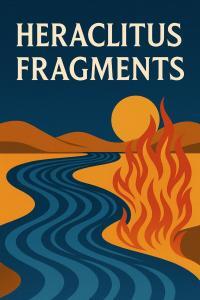
Fragments by Heraclitus – Heraclitus of Ephesus (c. 535 – 475 BC) is one of the most enigmatic figures of early Greek philosophy. Known as the “Weeping Philosopher” or “Heraclitus the Obscure,” he left behind only fragments—brief aphorisms that have challenged and inspired thinkers for more than two millennia.
Heraclitus’ central idea is the doctrine of flux: all things are in a constant state of change, and stability is an illusion. His famous phrase, “You cannot step twice into the same river,” expresses this vision of reality as a ceaseless process of becoming. Alongside this, Heraclitus posited the Logos, a rational principle underlying the apparent chaos of existence, accessible to those willing to look beneath appearances.
The fragments deal with opposites—life and death, day and night, war and peace—showing them not as contradictions but as interdependent aspects of the whole. His thought profoundly shaped later philosophy, influencing Plato, the Stoics, and even modern existentialists. Nietzsche admired Heraclitus as a kindred spirit, seeing in him the first philosopher of becoming and strife.
This collection presents the surviving sayings of Heraclitus in English translation, drawn from ancient sources who quoted him. Although incomplete, the fragments preserve the striking poetic power of his style. Heraclitus speaks in riddles, but his words resonate with timeless urgency about change, order, and the search for wisdom.
For readers of philosophy, mysticism, or classical history, Heraclitus – Fragments offers a direct encounter with one of antiquity’s most original voices. Download the free PDF e-book here:

